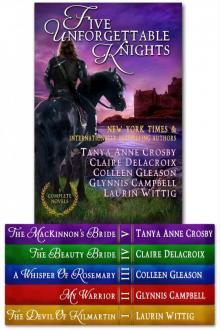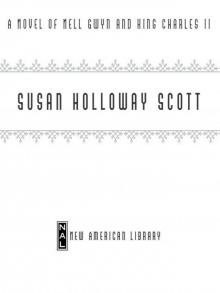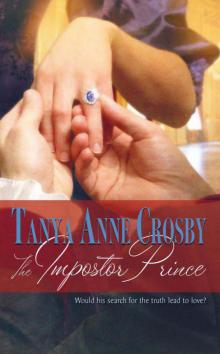- Home
- Tanya Anne Crosby
Fire Song (Daughters of Avalon Book 4) Page 15
Fire Song (Daughters of Avalon Book 4) Read online
Page 15
Seren was coming to understand him better. To be sure, he had a servant’s heart in that burly breast, even if his demeanor was far from subservient.
In fact, she wondered how those Warkworth brothers fared when together. As well as she could remember Giles, she didn’t believe he was all too forbearing, and she had a vision of them coming to fists quite oft. Men were like that, she supposed, simply because they could be. No matter what circumstances they met, she and her sisters hadn’t the luxury to quarrel about who should be in command. They might not always agree about what path should be taken, but all together they discussed it, giving every argument equal merit. Dewinefolk were not so concerned with kings or queens, nor earls or barons. According to their tenets, all men and women were created equal, and even Rhiannon would not presume to command them.
For a while, there was a priest in residence at Llanthony—one Father Cabot. For the most part, he’d been a kindly soul, but Seren could see that he had his own plan for the priory, one that didn’t align itself with Father Ersinius’ plan. Those two had argued and often, and soon it became apparent that two such strong-willed men could never preside under the same roof. So, Father Cabot departed one day, and Ersinius was inordinately pleased by the fact though betimes, Seren wondered where the man had gone, mainly because on the day he departed no one came to call for him, nor did he take a priory wagon or a horse from the stables. He simply vanished. Though, of course, it was entirely possible he took the Rhiw Pyscod afoot to Llangorse, no word ever arrived to corroborate that fact. It was also possible that he went to Abbey Dore, but that didn’t seem likely either since Llanthony was Augustinian and Abbey Dore was Cistercian.
Perhaps it should seem a small matter for men who all claimed to follow the word of the same God, but it was not. This was, in truth, much the source of Father Cabot’s dissent. He was a true Augustinian by nature, which was to say he interpreted scripture quite severely. He’d believed in living in silence, eating and drinking sparingly. Manual labor did not suit him. To his manner of thought, men and women should spend all their time contemplating God in prayer, and while he was never precisely unkind to Seren and her sisters, he never condoned their presence at Llanthony—not merely because they were women, but because they were presumed to be witches.
Seren loathed that word for all it implied. To be sure, no one ever called her or her sisters witches with a smile. Even Ersinius, who’d vehemently argued the need for their asylum, had treated them rather poorly. Overall, though he’d claimed to answer to the Rule of St. Augustine and the Austin Friars, he was more Cistercian in nature, turning Llanthony into a flourishing center of trade. If not by word, by deed, he was of the mind that everyone should do their part, and he was more concerned with how to make their God-given lands a service to God, hence the hatchery and the aviary. Moreover, he was inclined to seek grants to apply his “works” though a true Augustinian would no more put expensive German waldglas in a vestibule—three times no less—than he would ever approve of having Morwen’s witchy daughters on the premises, only for the sake of gold.
As for the Vale of Ewyas over which the priory presided, it was no more God-given than it was modeled after St. Augustine’s rule. Those lands, along with the majority of the Black Mountains, were stolen from her people, snatched perforce and by royal decree from men who would never call that English Usurper king. But, so long as Stephen of Blois sat on her father’s throne, Wales would never come to heel. Even now, it made her smile to think of that defiant child who’d smashed the chapel’s windows—not once, but twice.
“We should be another three or four days before arriving at Neasham,” Wilhelm said, interrupting her reverie.
He was impaling his cony on a skewer, and though Seren was growing accustomed to the sight of depilated hare, she held her gaze aloft of the poor beast.
“Neasham?”
“Abbey,” he explained. “If you’d like to, we can stay overnight. I know the prioress well enough to beg a favor.”
Seren nodded, rubbing her arms absently. She knew those nuns, too. They were dressmakers for the Crown, and they were nice enough, to be sure, but not so much after learning they were Morwen’s daughters. However, unless Sister Emma had returned to their fold, they wouldn’t recognize Seren, and she hoped Wilhelm would keep that bit of information to himself. “Yay,” she said, looking up into the canopy of shimmering green. “I think it could be nice; thank you, please.” She would desperately love a bath, and a change of clothes. She could have donned one of the dresses Wilhelm bought her long before now, but it seemed abominable to do so when she smelled like the Thames.
“I suppose I should say… it was your sister Rosalynde who earned that lady’s good will. She offered Mother Helewys five gold marks for alms.”
“Five gold marks?”
“Aye,” he said. “I know. She said it was all she had.” And he smiled very fondly. “Your sister is—” He paused, seemingly unable to find the proper words to describe Rose, and his cheeks flushed so brightly. Seren presumed it was because he was trying and finding it difficult to tell her he loved Rosalynde, but it was clear enough by his words and his actions. Once again, she felt a stab of envy. “You care for her, do you not?”
He lifted his gaze from the cony. “Rosalynde?”
Seren nodded.
“Aye,” he confessed. “I do. And, if you ask me, the world needs more ladies like her, and fewer pious fools. I am so sorry about your grandmamau.”
Seren blinked in surprise. He knew about that, too?
Sweet fates, what didn’t he know? Clearly, Rosalynde had confided all, and Seren felt yet another inexplicable stab of jealousy, though she had never envied her sisters aught.
In truth, it was Seren who was blessed with the most good fortune, and it was about time the Mother Goddess blessed someone else, but… well… she didn’t wish to entertain those thoughts either.
Sighing very wistfully, she wished she could read Wilhelm’s thoughts as Rhiannon or Elspeth could do. Much like his face, his aura suddenly turned scarlet, and she assumed it was because he was thinking of Rosalynde. Red, after all, was the color of passion.
It was also the color of fury, but there was naught about Wilhelm’s demeanor that betrayed the latter. Aside from his surliness, she’d come to see that he was as placid a man as his sort could ever possibly be, taking immense pleasure in the task he’d been given—namely sheltering her and returning her to safety. She only wished she could do something to repay him.
“Wilhelm… I was thinking… mayhap I could teach you,” she said, regarding him across dancing flames.
Overhead, the rising moon was a smile upon the twilight sky.
“Teach me… what?”
“To… read… letters.”
His brows twitched, and then he frowned.
“That was our price for passage aboard the Whitshed. When Captain Airard realized we didn’t have fare for Calais, he asked we teach his son to read.”
Wilhelm’s gaze narrowed and he maintained his silence, his blush only heightening. Heartily afraid that she’d offended, Seren said, “Tis hardly a sin not to be able to read.”
“And nevertheless, you and your sisters, and Jack—”
“His trade demands it,” Seren explained gently. “As for me, and my sisters… we were locked away in a priory, with little more to do but garden and learn letters.”
He lifted a dark brow. “And cast spells?”
Seren blinked, surprised to find that his lips had turned at the corners and his near-ebony eyes had caught flames in both pupils. The smile transformed his face, stealing Seren’s breath. He was teasing her, she realized, sensing a glint of humor, and she blinked once more in surprise. “Yay, I suppose,” she said. And then, “Well, at least, I did. Arwyn tried. But Rhiannon never needed any practice, nor did Rosalynde.”
“What about your eldest sister, Elspeth?”
“Aye, well, for so long Elspeth was afeared of the Craft.” Seren n
arrowed her gaze at Wilhelm, putting him on the spot. “But regardless of what you have said it seems to me you are not.”
Wilhelm shrugged. “You mistook my meaning, I think. I did not say I was afraid of you, Seren. Verily, there are worse things in this world than witchery.”
“We are not—”
“Witches, yay I know. So, Rosalynde said.” He tipped his chin to indicate the boy, who’d only just returned and was dumping an armload of tinder into a pile near the horses.
“Bones o’ the saints, lad. Did you leave any rock unturned?”
Even dirtier now than he was before he left, Jack scratched at the top of his head, leaving a few greasy strands standing on end. “But ye said—”
“I know what I said, whelp. That was an hour ago. What have you been doing so long?”
Seren giggled to hear their banter—so familial. The lighthearted chatter reminded her of her sisters—until Jack’s next words gave her a fright.
“I was out speaking to a bird,” he said, and when Wilhelm tilted his head, he added, “I am not lying!”
Fingers of dread squeezing Seren’s heart. She met Wilhelm’s gaze, swallowing convulsively as she then cast her gaze into the trees. They were in the Royal Forest of Kesteven only days north of London. “Was it a raven?” she asked.
Jack shrugged. “I don’t know what it was, it was big.”
Wilhelm asked, “And… you say you spoke to it?”
Jack shrugged again. “I don’t know.” He scratched nervously at the hair above his ear, tousling more greasy locks. “I thought I heard my name, like this: Jaaack! Jaaaack! But when I tried to make it speak again, it would not.”
Seren’s heart thumped painfully against the cage of her ribs, and with a gob in her throat, she cast another glance at Wilhelm, who instinctively seemed to comprehend what it was she was thinking. Very, very casually, he dropped the skewered cony onto the spit, and said, “I’ll be back.”
“I can come too?” asked Jack.
“Nay,” barked Wilhelm. “I’ve no need of an audience to piss. Stay here, and see to your lady. Eat your dinner.”
There was no question about disobeying his command. Disappointed though he must have been, Jack stayed, coming into the circle to sit beside Seren.
“Cony again,” he grumbled, sounding disappointed. “I wish it were bacoun.” And then, with Wilhelm’s departure forgotten, he asked her, “’Ave you never tasted bacoun, Lady Seren? Me and my papa ’ad it first time this Yule.”
Seren’s gaze shifted from the woodlands where Wilhelm had gone, and then to the cony and then to Jack’s face, shaking her head, distracted.
He sounded sad now. “We were supposed to save some for me mum. But we didn’t, and I was mad when he ate it, but now I am not.” He reached out to gently turn the spit in Wilhelm’s stead. “’E said it was the best bacoun ‘e ever ate, and now I do not suppose I’ll eat it again.”
“Aye, you will,” Seren promised, hoping Morwen wasn’t out there. If, in truth, he had been speaking to one of her birds, her mother couldn’t be far. “Once we arrive at Warkworth, I will see to it you get to carry some home to your mum.”
And she only hoped it was a promise she could keep.
19
Giles had no sooner stabled his mount and entered the palace when the king’s steward intercepted him. At once, he was ushered into a private meeting, where Stephen acknowledged his entrance with a nod—so much for washing the dirt from his travels before addressing the king.
He soon discerned why: It was an emergency meeting of the Rex Militum—a secret league, known only to a few. It was perhaps similar to the Papal Guard, only licensed to enforce the King’s Law, by sway, or by sword. Giles was one of eleven men present today, including William d'Aubigny, the Earl of Arundel and Cael d’Lucy, the newly appointed Earl of Blackwood. In attendance, as well, was the Queen Consort of England, and though she was not seated precisely at table, her attendance could hardly be mistaken. Whatever lack of affection she and her husband shared in the bedroom clearly it did not extend itself to his court. Giles had always suspected her to be a driving force in her husband’s politiks, but now he knew it for certes. It was uncommon to see any woman in such a venerable position, and Henry himself, though he’d raised up his daughter to be his heir, never granted such liberties to either of his wives, nor to Matilda.
Adeliza of Louvain had been a quiet lady, with grace beyond her years. She would never have presumed to advise Henry. And though Henry had worshipped his first wife, she, too, would never presume to advise him as Maude did with Stephen. In fact, so far as the Empress was concerned, it came as little surprise that Stephen could so easily rouse the barons against her when even her own father never took her seriously.
Nor, in truth, had the Vatican ever considered bowing to a woman’s sovereignty. The instant Matilda’s first husband died she’d had to cede the Empire to her husband’s successor. Her crowns, such as they were, were only adornments now, and no matter how proudly she wore them (or how stubbornly), she would never wear them on her father’s throne. After all was said and done, Duke Henry was their only true chance to restore the realm to Beauclerc’s blood.
Curious about the agenda, Giles remained silent, listening.
He was not a member of this cloak and dagger company, and he only knew of its existence because one of the members was also a spy for the Papal Guard—of which no doubt, Stephen had already surmised Giles was a constituent. Even as he took his seat, the mood in the chamber turned grimmer and the men sat on tenterhooks. The candle flames stilled over the hush of the room.
King Stephen held a small taper before him, with a wick that had burned so long it nearly consumed itself. He spoke gravely, “Tis no’ enough he insults my wife—his blood—forswearing her right to be my queen. My spies tell me he intends to seize York, and I’ll not sit idly by whilst David mac Maíl Choluim robs me of another bishopric.”
Remembering a conversation he’d had only months ago with the king of Scotland, Giles wondered how Stephen discovered the plot. So, it seemed, he still had spies at large—not Malcom, for certes. From what he knew of Malcom Scott, he was not a vacillator. He’d turned his back on kith and kin once before, and Giles doubted he would return to the Scots’ fold only to play them false. At any rate, one did not rouse entire armies, with thousands upon thousands of warriors, only to act as though on the stage of a play. Nay. It was not Malcom, though he had his suspicions over who it might be…
The silence was deafening, until Stephen spoke again. “You’d think it was enough to have Carlisle—bastard.”
“Your Grace, I did warn that it was a mistake not to challenge him all those years ago,” said one of his counselors. “He has established himself well enough that England will be hard-pressed to ever see his lands or levies again.”
The king’s gaze slid to the man speaking—tall and lean, with dark hair that was shorn to the nubs. His face sported a number of scars. And judging by the mirror image of the face of the man seated beside him, those two must be the Beaumont twins, Waleran and Robert. In reward for their services, Stephen had already awarded them Worcester, Leicester, Hereford, Warwick and Pembroke. Now that Robert of Gloucester was dead, the Beaumont twins might well be the most well-appointed men in the realm.
“Your Grace, I am also hearing rumors to the effect that Duke Henry is bargaining with Ranulf to give up his claims to Carlisle in return for the Honour of Lancaster.”
The king twisted his lips. “De Gernon?”
“Aye, Your Grace, de Gernon.”
“You should never have trusted the faithless bastard,” interjected D’Lucy, with an ease and familiarity regarded only to a man of his station. “I warrant de Gernon has flipped more times than a gambler’s coin.”
Someone else interjected. “I believe that is true, Your Grace. We are fortunate enough to have discovered his intentions in Wales, or we would still be mired in disputation.”
Cael d’Lucy rested h
is face between his thumb and forefinger, regarding the speaker pointedly. “Are we not still mired in disputation? Pray tell, know you something I do not?”
“If there is disputation, perhaps you should look to yourself. You had Elspeth Pendragon at your whim, and yet you tarried so long she made you a fool. Now, you will tarry with her sister, until—”
The king waved a hand in dismissal. “God’s bones! That is a matter for another time,” he said. “The matter for discussion is Carlisle, and Carlisle is not Ranulf’s to bargain with.”
“And, nevertheless, if David agrees to the terms, de Gernon will give homage to David and Duke Henry both, and with the backing of the Scots, they will surely turn their heads toward York.”
“Why? Why should David give up Carlisle when he has clamored for that seat so long as he’s had hair on his balls?”
“For the glory of York, Your Grace.”
“He would, for York,” agreed another.
Giles watched the king’s men—head gestures and subtle hand signals… Clearly, there were spies in David’s court and spies in the Earl of Chester’s retinue… all these men were well connected… none more so than Cael d’Lucy.
The two regarded each other with an air of affected boredom, but there was underlying tension burning beneath the surface. Giles was the first to look away.
“Father,” said Eustace—that fresh-faced bastard responsible for the burning at Warkworth. “Send me north with my army,” demanded the nineteen-year-old scissorbill.
My army, not yours—as though he already possessed them.
The bloody wretch had a title he didn’t deserve, and somehow, his father would still advocate to place him on the throne. The very truth of that was deplorable. Eustace was naught but a stupid little boy with an ego as immense as his head, and his villainy would someday be his undoing.
It wasn’t enough he was said to abuse his own wife, an esteemed princess of the House of Capet; he was a brutal liegeman as well. If Giles were the lady’s sire, he would gut the muckspout from belly to throat, and it was all he could do to look at him now.

 Lord of Shadows (Daughters of Avalon Book 5)
Lord of Shadows (Daughters of Avalon Book 5) To Love a Lord: A Victorian Romance Collection
To Love a Lord: A Victorian Romance Collection The Daughters of Avalon Collection: Books 1 & 2
The Daughters of Avalon Collection: Books 1 & 2 The Impostors: Complete Collection
The Impostors: Complete Collection The Holly & the Ivy (Daughters of Avalon Book 2)
The Holly & the Ivy (Daughters of Avalon Book 2) A Winter’s Rose
A Winter’s Rose Fire Song (Daughters of Avalon Book 4)
Fire Song (Daughters of Avalon Book 4) Elizabet
Elizabet Kissed; Christian
Kissed; Christian Once Upon a Knight
Once Upon a Knight Viking: Legends of the North: A Limited Edition Boxed Set
Viking: Legends of the North: A Limited Edition Boxed Set Five Unforgettable Knights (5 Medieval Romance Novels)
Five Unforgettable Knights (5 Medieval Romance Novels) Meghan: A Sweet Scottish Medieval Romance
Meghan: A Sweet Scottish Medieval Romance Reprisal: A Prequel Short Story to REDEMPTION SONG
Reprisal: A Prequel Short Story to REDEMPTION SONG Highland Song
Highland Song The Summer Star: One Legend, Three Enchanting Novellas (Legends of Scotland Book 2)
The Summer Star: One Legend, Three Enchanting Novellas (Legends of Scotland Book 2) Once Upon a Kiss
Once Upon a Kiss MacKinnons' Hope: A Highland Christmas Carol
MacKinnons' Hope: A Highland Christmas Carol The MacKinnon's Bride
The MacKinnon's Bride Highland Brides 04 - Lion Heart
Highland Brides 04 - Lion Heart A Perfectly Scandalous Proposal (Redeemable Rogues Book 6)
A Perfectly Scandalous Proposal (Redeemable Rogues Book 6) Reprisal
Reprisal Maiden from the Mist (Guardians of the Stone Book 4)
Maiden from the Mist (Guardians of the Stone Book 4) Tell No Lies
Tell No Lies The King's Favorite
The King's Favorite Meghan: A Sweet Scottish Medieval Romance (Sweet Scottish Brides Book 2)
Meghan: A Sweet Scottish Medieval Romance (Sweet Scottish Brides Book 2) The Impostor Prince
The Impostor Prince Happily Ever After
Happily Ever After Sophie's Heart: Sweet Historical Romances
Sophie's Heart: Sweet Historical Romances Viking's Prize
Viking's Prize Page
Page Angel of Fire
Angel of Fire Once Upon A Highland Legend
Once Upon A Highland Legend Highland Brides 03 - On Bended Knee
Highland Brides 03 - On Bended Knee Sagebrush Bride
Sagebrush Bride Lyon's Gift
Lyon's Gift Lady's Man
Lady's Man The King's Favorite (Daughters of Avalon Book 1)
The King's Favorite (Daughters of Avalon Book 1) Highland Storm
Highland Storm Redemption Song
Redemption Song Three Redeemable Rogues
Three Redeemable Rogues